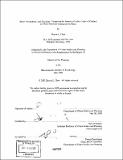| dc.contributor.advisor | Dara O'Rourke. | en_US |
| dc.contributor.author | Chan, Sharon L., 1972- | en_US |
| dc.contributor.other | Massachusetts Institute of Technology. Dept. of Urban Studies and Planning. | en_US |
| dc.coverage.spatial | a-cc--- | en_US |
| dc.date.accessioned | 2011-08-01T14:34:14Z | |
| dc.date.available | 2011-08-01T14:34:14Z | |
| dc.date.copyright | 2002 | en_US |
| dc.date.issued | 2002 | en_US |
| dc.identifier.uri | http://hdl.handle.net/1721.1/65061 | |
| dc.description | Thesis (M.C.P.)--Massachusetts Institute of Technology, Dept. of Urban Studies and Planning, 2002. | en_US |
| dc.description | Includes bibliographical references (leaves 101-103). | en_US |
| dc.description.abstract | In the past decade, a spate of reports has surfaced about the substandard labor conditions in foreign-owned and operated factories located globally that manufacture goods for multinational brand firms. The response of companies under scrutiny for engaging in "sweatshop" practices has been to formulate corporate codes of conduct. The codes serve as sourcing guidelines for the firms and as a set of standards for labor and environmental practices for their subcontractors. This thesis presents an exploration into whether corporate codes of conduct are effective in improving factory conditions as well as workers' lives. I investigate the question with a case study of three footwear factories in southern China that manufacture for major multinational brand firms, using a qualitative approach based on interviews with factory managers, supervisors and workers. The findings suggest that brand firms play a vital role in ensuring code compliance, and that carving out a participatory role for workers determines the success of code enforcement strategies. I then propose that an active mode of engagement is more useful for corporations that seek to improve labor standards in China. The paper concludes with policy recommendations for strengthening the efficacy and role of codes of conduct. | en_US |
| dc.description.statementofresponsibility | by Sharon L. Chan. | en_US |
| dc.format.extent | 103 leaves | en_US |
| dc.language.iso | eng | en_US |
| dc.publisher | Massachusetts Institute of Technology | en_US |
| dc.rights | M.I.T. theses are protected by
copyright. They may be viewed from this source for any purpose, but
reproduction or distribution in any format is prohibited without written
permission. See provided URL for inquiries about permission. | en_US |
| dc.rights.uri | http://dspace.mit.edu/handle/1721.1/7582 | en_US |
| dc.subject | Urban Studies and Planning. | en_US |
| dc.title | Shoes, sweatshops, and sanctions : comparing the impacts of labor codes of conduct in three footwear contractors in China | en_US |
| dc.type | Thesis | en_US |
| dc.description.degree | M.C.P. | en_US |
| dc.contributor.department | Massachusetts Institute of Technology. Department of Urban Studies and Planning | |
| dc.identifier.oclc | 50854530 | en_US |
